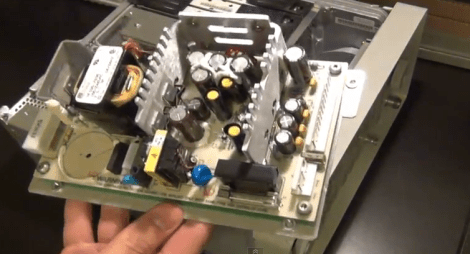
We must be walking past the wrong dumpsters because we certainly haven’t encountered equipment like this just waiting to be salvaged. [Shahriar] found an HP 8648C Synthesized Signal Generator while he was ‘dumpster diving’ and set out to fix the malfunctioning lab equipment. He posted a 1-hour video on the project, which you can find embedded after the break. The actual fix happens in the first half, the rest of the video is spent testing the resurrected device.
The back corner of the case has been dented, which may be the reason this has been thrown out. When it is first powered it emits an unpleasant screeching noise and the user interface doesn’t do anything. [Shahriar] says he recognizes the sound as a malfunctioning switch-mode power supply. Sure enough, when disconnected from the main board it still makes the noise. It turns out there’s a huge electrolytic capacitor the size of a stack of poker chips which has come loose from the PSU board. When it’s resoldered the device fires up as expected.
Now how are we going to find a digital capture oscilloscope that just needs to have its PSU reassembled?















My method to fix old electronics:
1) Open Thing
2) Find bad capacitor in Thing
3) Replace bad capacitor in Thing
4) Did it work? Done.
5) Still not working? Wait for someone smarter to show up.
If still not working, find 2nd bad capacitor in Thing.
theres usually about 20 of em that are weeks away from failing. gotta catch em all!
Funny how many LCD monitors I’ve fixed with that exact trick.
Always a pleasure to find my work on HaD. Thank you!
PS: At the end of the video I go through the block diagram of the instrument and explain the principle of operation. I hope you would find that useful.
How many times did you redo a section? I can’t believe you talked for an hour that glibly & concisely. No ‘ums’ or ‘ahs’, nor any other irritating ticks that I noticed. Thanks for that video.
Hi! I almost never redo any section. All the videos are unscripted. I just don’t have the time! :)
Wow, I’m browsing the wrong dumpsters too!
A bunch of years ago, I volunteered at a computer recycling program in my community. They’d let me take whatever I wanted at scrap prices. One day the local college dropped off a literal truckload of stuff, they’d just redone their entire network infrastructure.
Among the items in the haul were like 10 ethernet/Appletalk bridges or somesuch, and half a dozen rackmount 24-port 10baseT ethernet hubs. Even at the time, they were fairly useless for networking, but I took them anyway for the rackmount enclosures. It turned out there was a nice bonus; all the devices (All made by a company called Cayman) used the same TDK-manufactured power supply board. They supply +5@4A, +12@2.5A, -12@0.3A, and are nicely designed and self-contained.
Still haven’t made much use of them yet, but I’ve been meaning to make a couple very nice benchtop supplies.
I have to go dumber diving, isn’t it illegal though? I mean to do it on private property. Or at least I guess it’s frowned upon. But why would we really care.
Make sure it is from a public location. Saving things from ending up in a land-fill is beneficial to everyone.
“We must be walking past the wrong dumpsters”
That’s your problem- you’re walking past, while I am diving in. You probably didn’t even see my down there, digging.
Who has got my electronics finding, dumpster prowling bot?
Better question: Why did whomever threw out this signal generator not bother to fix it himself? If you’ve got a signal generator, it’s pretty likely that you’ve got some electronics know-how.
Time and/or money. If it was thrown out by a business then it could be that the time spent fixing it would cost more than replacing it.
^This. Extra expense because the repaired unit would probably require expensive recalibration, making it more cost effective to just purchase a newer factory calibrated unit. I have many HP/Agilent pieces of test epuipment that I got cheap because it was more cost effective to sell them for scrap and buy more modern equipment rather than pay to get them recalibrated, even though they work perfectly…
Could have been a teacher that knew what it did and why, just not how it worked or why they bought it. I HaD a teacher in my Digital Electronics class tossing Prop BoE boards because of a few faulty components (mostly switches, and poorly soldered resistors) but i asked if I could take them, I had no intention to use them because I would rather use a more advanced dev board for my projects, but i fixed then sold them, quite a profit, some teachers don’t know their own subjects.
Or because they get so many of them that diagnosing and fixing them would take half their time.
Perhaps because of reliability reasons. The thing obviously fell pretty hard, so maybe they figured to throw it away, rather then risk using test equipment that might be out of call for some reason. Still silly though, if I worked at that company, I would have fixed it in my coffee break. :)
I generally fix stuff like this myself (I don’t bother to ask, I just fix it). On the other had, if it is going to be discarded, most companies (and government agencies) have policies that prevent employees from taking things home (whats to prevent someone claiming an item is “unrepairable”, then replacing a $2 capacitor?). Then again, my company does allow me to take PSUs and CPU fans out of old PC’s being junked, but worked for other places more anal about this…
funny.. I’m at work reading this surrounded by test equipment waiting to be repaired, and calibrated… and 10 steps away is the rest of the warehouse stacked to the walls and ceilings with more working and broken test equipment… *sigh*
Now get the HP service manual and spend more time getting this unit back to factory spec… I had a similar experience with an HP function generator, it was quite interesting to take the thing apart and find replacement components for the other parts inside that were out of spec and no longer made.
Doing this obviously requires additional test equipment, but if you are in an electrical engineering program at any university, you should have access to what you need.